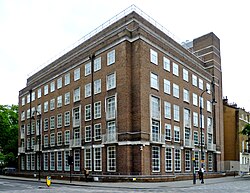Warburg Institute
 |
|
| Established |
|
|---|---|
|
Parent institution
|
School of Advanced Study, University of London |
| Director | David Freedberg |
| Location | London, England, United Kingdom |
| Website | www |
The Warburg Institute is a research institution associated with the University of London in central London, England. A member of the School of Advanced Study, its focus is the study of cultural history and the role of images in culture - cross-disciplinary and global. It is concerned with the histories of art and science, and their relationship with superstition, magic, and popular beliefs. Its researches are historical, philological and anthropological. It is dedicated to the study of the survival and transmission of cultural forms – whether in literature, art, music or science – across borders and from the earliest times to the present including especially the study of the influence of classical antiquity on all aspects of European civilization. Based originally in Hamburg, Germany, in 1933 the collection was moved to London, where it became incorporated into the University of London in 1944. In 2015, the Institute welcomed its new Director, Professor David Freedberg, and settled a long-running legal dispute with the university over its financial status.
The Institute was formed in Hamburg, Germany, from the library of Aby Warburg (1866–1929), a student of Renaissance art and culture, and a scion of the wealthy Jewish Warburg family.
As an art historian, Warburg had become dissatisfied with an aestheticising approach to art history and was interested in a more philosophical and interdisciplinary approach. While studying the culture of Renaissance Florence, he grew interested in the influence of antiquity on modern culture, and the study of this second life of the Classical World became his life work. In 1900 he decided to establish the Warburg-Bibliothek für Kulturwissenschaft, which became an enormous private library, built around this question and funded privately—Warburg "famously forfeited his right to a share of his fortune on condition that his younger brother Max would buy him any books he required".
...
Wikipedia
